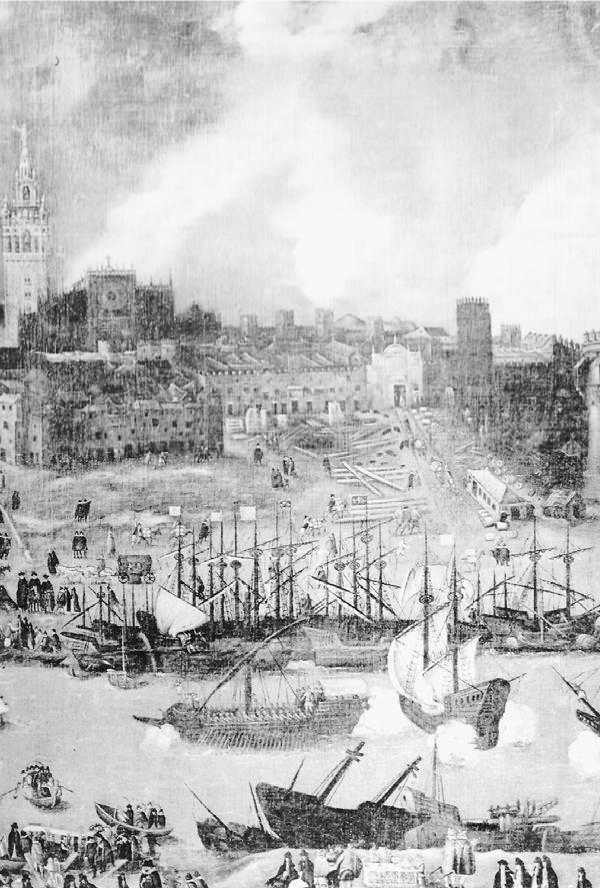Excerpt from Description of Africa
Published in Readings about the World, Volume 2, 1999
The Sahara Desert in Africa is larger than the continental United States. Not surprisingly, this most forbidding of all deserts ensured that the southern part of the African continent would be shut off from the northern part, where the people had much greater opportunities for communication with other lands. Some of the most notable civilizations of premodern Africa, however, arose on the edges of the Sahara.
Among these was Ghana (GAH-nuh), which reached its high point in the a. d. 1000s. Ghana became incredibly wealthy and powerful, largely on the strength of its enormous gold reserves. Another important center of civilization was the city of Timbuktu, which flourished under the empires of Mali (MAHL-ee) and Songhai (SAWNG-hy) during the 1300s and 1400s. So many scholars lived in Timbuktu that, according to Leo Africanus (c. 1485-c. 1554), books were the most highly prized items sold in the markets there.
Yet despite Ghana's riches in gold, and the intellectual wealth of Timbuktu, both were in a highly fragile situation. From the description of Ghana written by al-Bekri (beh-KREE) in about 1067, it is hard to imagine that the splendid empire
"The king of Ghana can put two hundred thousand warriors in the field, more than forty thousand being armed with bow and arrow."
From Al-Masalik wa 'l-Mamalik
"Many hand-written books imported from Barbary are also sold [in the market at Timbuktu]. There is more profit made from this commerce than from all other merchandise."
From Description of Africa 23
Al-Bekri and Leo Africanus
Little is known about al-Bekri, except that he was a Muslim from Spain who visited West Africa in about 1067. The record of his travels, Al-Masalik wa 'l-Mamalik, has not even been translated into English; instead, the version included here comes from author Basil Davidson's English rendering of a passage from a French translation.
Leo Africanus is more well known. Like al-Bekri, he was a Muslim from Spain, but he came into the world just seven years before the Christian rulers Ferdinand and Isabella drove out all Muslims in 1492. Therefore he and his family fled to Morocco, where his uncle became an official in the Islamic government. Thus the young man
Had an opportunity to travel throughout northern Africa, but on one trip in 1517, when he was thirty-two years old, he was captured and enslaved by European pirates.
Up to this point, he had been known by an Arabic name, but when his reputation as an extremely learned slave gained him an introduction to Pope Leo X (ruled 1513-21), the pope took such a liking to him that he gave him his own name. Thus he became Leo Africanus, or Leo the African, and accepted Christianity. Under the pope's direction, he wrote Description of Africa, which for many years remained Europeans' primary source of knowledge on Africa.
Would come to an end in just a few years; but behind the scenes, a clash of cultures was forming. The capital of Ghana, Kumbi-Saleh, had been formed from two towns about six miles apart. One town became a center for Islam, al-Bekri's own religion, whereas the other remained a stronghold of the native religion. Eventually the Muslim faith would win out, in the process destroying the power of the king, whose people had believed he was a god.
Timbuktu, on the other hand, was predominantly Muslim when Leo Africanus, another Islamic traveler, visited there. (His reference to the ruler's dislike for Jews, however, is not typical of medieval Islam: during the Middle Ages, Jews and Muslims typically got along well.) Yet Timbuktu faced other threats. One of these was the harsh surrounding environment, to which Leo referred in his account. Another was the near-constant state of warfare between various African peoples in the area. Though they were not necessari-
Ly of different races, their cultures and ways of life were often in conflict, and eventually this struggle would bring an end to the glory of Timbuktu.

Fihini Village in modern-day Ghana. When al-Bekri visited Ghana in about 1067, the empire was extremely wealthy and powerful. Reproduced by permission of the Corbis Corporation.
Things to remember while reading the excerpts from Al-Masalik wa 'l-Mamalik and Description of Africa
•Though the term "Negro" came to have a negative meaning in the late twentieth century, al-Bekri's use of it does not imply a racial judgment; rather, he used it as a simple descriptive term equivalent to the word "Caucasian" for white people.
• Both writers were born in Spain when it was under Islamic control, but Leo Africanus wrote his account for Europeans. Therefore he
Used units of measure such as the mile and the ducat (DUK-et), a type of money in Europe, whereas al-Bekri used Middle Eastern words: dinar (dee-NAHR) and mitqal (meet-KAHL) for units of money, and vizier (VIZ-ee-ur) for a type of government official.
• The two writers make a number of interesting observations about the economic systems of Ghana and Timbuktu. Salt was and is a highly valued item in the Sahara: even today, African merchants do a brisk business selling the mineral, which is necessary to human life but scarce in the region. Al-Bekri also noted that if the king of Ghana did not control the supply of gold, it would lose its worth, a fact that is true of any unit of value, whether it be gold, paper money, or another item. Leo Africanus, for his part, perhaps said a great deal when he wrote that "The inhabitants are very rich, especially the strangers who have settled in the country." This seems to imply that the people of Timbuktu
Port of Seville, Spain. Al-Bekri was a Spanish muslim who spent some part of his life in this Spanish city. Reproduced by permission of the New York Public Library Picture Collection.

Were not becoming wealthy in as great numbers as the foreigners in their midst.
• Many of the names used by the two travelers are lost to history. The locations of Ghiaru and Tegaza are not clear. Nor is there much information about the architect named Granata, who must surely have been a prominent citizen of Timbuktu.




 World History
World History









